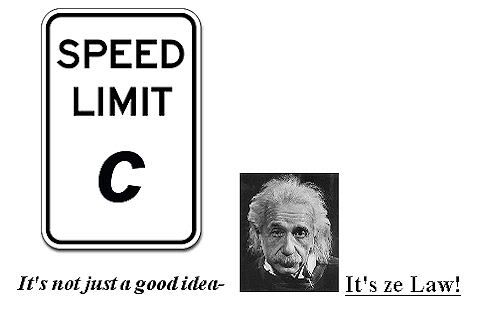
Posted on 06/28/2014 12:14:35 PM PDT by BenLurkin
The University of Maryland physicist believes the delay could have been because the light was in fact slowed as it travelled due to something known as 'vacuum polarisation'.
During this phenomenon, photons break down to something known as ‘positrons’ and electrons for a split second. before combining together again.
When they split, quantum mechanics creates a gravitational potential between the pair of ‘virtual’ particles.
Dr Franson argues that the process might have a gradual impact on the speed of the photon, meaning that over 168,000 light years, the photons may have suffered a near five-hour delay.
If the physicist is correct, it means scientists have to recalculate everything from our distance to the sun to some of the most distant objects seen in other galaxies.
(Excerpt) Read more at dailymail.co.uk ...
Placing my bet on the old patent clerk.
You can go faster than the speed of light. The fact light can’t catch up with the speed of matter is not my problem.
Same here.
1987a has long been studied and the difference in time between the arrival of neutrinos and light here on Earth is understood.
http://en.wikipedia.org/wiki/SN_1987A#Neutrino_emissions
It should also be noted that Franson is not an astrophysicist.
http://cybersecurity.umbc.edu/training/faculty/james-franson/
Oh crap. Am I going to have to set my clocks back?
fascinating
At those speeds you are neither matter or light...
you are aliens.
does this mean that stars might be a lot closer than we thought?
That’s pretty much what I’ve been thinking all along.
In some cases yes
I’m glad we figured this out before we warped right into the center of a star!
*whew*
“....creates a gravitational potential between the pair of ‘virtual’ particles.”
While having to pack for a bit longer trip to Alpha Centauri, I wonder if the real discovery doesn’t have something to do with being able to create an anti-gravity device.
Stephen Hawking theorized that virtual particle-antiparticle pairs could spontaneously appear just outside the event horizon of a black hole, permitting one of the pair to enter the black hole and the other to escape, thus allowing matter to effectively escape from the black hole. The uncertainty principle permits otherwise impermissible things to happen as long as they don't require too much mass-energy or last too long.
It does seem to me conceivable that a photon moving through space could possibly undergo a similar transition, subject to the same uncertainty limitations. Conservation of mass-energy and momentum could perhaps insure that the photon which results at the end of the transition would have the same momentum (that is, direction) as the original photon. Whether the observed speed of the photon would be reduced is a question beyond my ability to conjecture.
The linked article suggests a delay of 4.7 hours over a path which takes 168,000 years to cover. I calculate that that is a discrepancy of roughly 3 parts per billion. That sounds to me like a pretty large error to have escaped observation given the great accuracy of time measurements possible today.
25.67 trillion miles to Alpha Centauri.
There’s your starting point. You do the math, I’m not even going to try.
light is just an identifier of the existence of matter, it does not limit matters law of existence
how fast matter moves is matters business
What do the guys from The Big Bang Theory (except Howard) have to say about this?
Exactly, the improbability of the position of matter makes space travel impossible.
Disclaimer: Opinions posted on Free Republic are those of the individual posters and do not necessarily represent the opinion of Free Republic or its management. All materials posted herein are protected by copyright law and the exemption for fair use of copyrighted works.